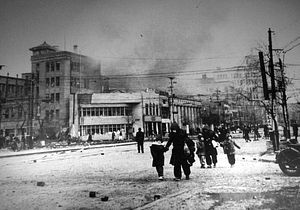In 1921, a relatively unknown Italian airman named Giulio Douhet wrote a book titled Command of the Air, which proposed an air power doctrine that envisioned the systematic, relentless bombing of enemy cities and populations to bring about an end to a war. Douhet even foresaw the use of weapons of mass destruction (in his time, poison gas) delivered by air power to decimate an enemy’s civilian population and end all resistance to capitulation. There is, in other words, a direct and logical line from Douhet’s theories to the Allied strategic bombing campaigns against Japan (and Germany), and the atomic bombings of Hiroshima and Nagasaki.
Douhet was born in May 1869, in Caserta, Campania, Italy. He studied at the Modena Military Academy and joined the Italian Army in 1882. He later studied at the Polytechnic Institute in Turin. After being assigned to the General Staff at the dawn of the air age, Douhet began writing about aerial warfare and the strategic uses of air power. During the First World War, he urged Italian leaders to build more bombers and use air power to defeat the Austro-Hungarian enemy, but his advice fell on deaf ears. He was actually imprisoned for a year as a result of his criticism of Italian military leaders. Upon his release, he was returned to active duty and placed in charge of the Italian Central Aeronautic Bureau. Douhet was promoted to general in 1921, the same year that he wrote Command of the Air. After he retired from the military, he continued to write on the strategic aspects of air power. He died in 1930.
In Command of the Air, Douhet asserted that the development of aeronautics created a new battlefield that required the creation of an independent air force. Future war, he explained, will necessitate having “an air force capable of accomplishing war missions solely with its own means, to the complete exclusion of both army and navy.”
Command of the air, he wrote, “means to be in a position to wield offensive power so great it defies human imagination.” War’s initial struggle will be to gain command of the air by rendering the enemy’s air power ineffectual. Once command of the air is achieved, air forces must be “capable of crushing the material and moral resistance of the enemy.”
War in the future, Douhet predicted, will be a conflict among whole peoples, not just armed combat among soldiers and sailors. The First World War showed that future war would become total war where there would be no distinction between civilians and soldiers. “The prevailing forms of social organization,” he explained, “have given war a character of national totality—that is, the entire population and all the resources of a nation are sucked into the means of war.” “Future war,” he wrote, “will be total in character and scope.”
In the next war, Douhet predicted, aerial offensives will target the entire territory of the enemy, including industrial and commercial establishments, governmental buildings, and population centers. The goal, he noted, will be to “[i]nflict the greatest damage in the shortest possible time,” resulting in a “complete breakdown of the social structure” of the enemy country due to “merciless pounding from the air.” Enemy civilians will face a “constant nightmare of imminent death and destruction” as air forces rain-down a storm of destruction.
Contrary to established military doctrine, Douhet asserted that the objective of war is not the enemy’s armed forces, but “to compel the enemy to bow to one’s will.” “[I]n order to win,” he wrote, “one must exhaust the enemy’s resistance before one’s own is gone.” Unrestricted air attacks, including the use of poison gas, Douhet explained, will break down both material and moral resistance. This is a “dark and bloody picture,” he wrote, but it is the reality of total war.
Douhet had little faith in international agreements designed to limit the destructiveness of war. Disarmament efforts, he claimed, are “bound to be futile.” “The limitations applied to the so-called inhuman and atrocious means of war,” he continued, “are nothing but demagogic hypocrisies.”
Douhet has been criticized for exaggerating the ability of air power to bring about decisive victory in war. During the Second World War, the Allies achieved victory not by air power alone, but by a combination of land, sea, and air power. But in a more limited sense, once the United States fought its way across the Pacific and southwest Pacific in a bloody series of battles and established bases from which to use its air power against the main islands of Japan, Douhet’s theories were put into practice and worked. The United States then defeated Japan by an unprecedented strategic bombing effort, culminating in the fire-bombings of Tokyo and the dropping of atomic bombs on Hiroshima and Nagasaki. These attacks, as Douhet predicted, crushed the material and moral resistance of the enemy and ended the war. The United States wielded offensive air power so great that, in Douhet’s words, it defied human imagination.
U.S. General Curtis LeMay, who led the strategic bombing effort against Japan, summed up Douhet’s theories as practiced in the Pacific War: “You’ve got to kill people and when you kill enough of them, they stop fighting.”
Francis P. Sempa is the author of Geopolitics: From the Cold War to the 21st Century (Transaction Books) and America’s Global Role: Essays and Reviews on National Security, Geopolitics and War (University Press of America). He is also a contributor to Population Decline and the Remaking of Great Power Politics (Potomac Books). He has written on historical and foreign policy topics for Joint Force Quarterly, American Diplomacy, the University Bookman, The Claremont Review of Books, The Diplomat, Strategic Review, the Washington Times and other publications. He is an attorney, an adjunct professor of political science at Wilkes University, and a contributing editor to American Diplomacy.

































